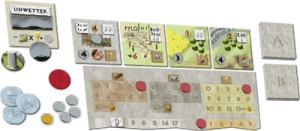Review: Peloponnes
Posted by James (admin) on November 5th, 2009
 Peloponnes was another Spiel 09 game that I pre-ordered based on reading the rules. I was also very interested because the designer created Maya, a game I really enjoy even though I tend to lose.
Peloponnes was another Spiel 09 game that I pre-ordered based on reading the rules. I was also very interested because the designer created Maya, a game I really enjoy even though I tend to lose.
Peloponnes is a civilisation building game that lasts 8 short turns. Players bid coins to purchase land or buildings tiles which generate resource income each round, plus some give one-off instant income. If you exceed certain amounts of a single resource, you get luxury goods instead which can be used in placed of other resources and are an important game mechanic.
To bid for tiles, a player places enough coins to equal or exceed the cost next to the relevant tile. If a following player outbids them, the outbid player moves their coin pile to another tile they can afford without changing the amount, or they remove their bid and take a bonus coin. Some tiles are bid on like this and a few others are available for instant purchase (no auction) but these cost 3 more than their stated price. A player can also not bid at all and receive 3 coins.
Building tiles may need some resources to be spent to build them; however, a player can delay paying the resource cost for a turn but the building will be removed if they don’t pay up. So, it is possible to buy a building for cash without the resources and benefit from the income for a round. Land tiles give their owner income each round but new land tiles must be placed next to another land tile that has one of the same resources on it. This can be tricky as you can only add to a land tile to the end of the row.
Several disasters occur during the game and some building tiles can protect against the effects. Also, twice during the game a supply phase occurs where players must feed their people or their population goes down too. The final goal is to finish with the as many points as possible and points are based on the lower of either three times your population level or the points value of your buildings plus money.
 Overall, the game plays very quickly and is simple. I played two 2-player games and we found that there wasn’t much interaction during bidding. This was a real shame as the game seemed almost straightforwards compared to how interactive it sounded in the rules (and from what I now hear from other people too). Without this bidding war, we just purchased tiles most rounds and we rarely wanted the same one. I think this would be very interesting with more players as it would necessitate careful thought in case you get outbid.
Overall, the game plays very quickly and is simple. I played two 2-player games and we found that there wasn’t much interaction during bidding. This was a real shame as the game seemed almost straightforwards compared to how interactive it sounded in the rules (and from what I now hear from other people too). Without this bidding war, we just purchased tiles most rounds and we rarely wanted the same one. I think this would be very interesting with more players as it would necessitate careful thought in case you get outbid.
One mechanic we fell foul off was that the land tiles that give higher income each round only give income of one resource type. This is very important because it is much harder to place further land tiles next to those (as new ones must include one of the same resources). As I say, we didn’t notice this mechanic and my opponent who had one of these tiles found he couldn’t purchase a single tile during one round which made a big difference. Now we understand it, we’ll know the payoff between bigger income and potential problem.
There are some interesting mechanisms within the game that are quite subtle at first. Using the luxury goods in place of other resources (especially food when you need to feed your population or they’ll perish) means you can specialise in collecting a few resource types rather than need to collect them all.
In conclusion, I did really enjoy the game and look forwards to playing it again, especially with the lighter games group I play with. I want to play it with 4 players which I think will work well. However, if you try to play it without acknowledging the subtleties, you may well miss some of the parts that should add extra flavour. In a game where you only have a chance to buy 8 tiles, every purchase is important and, if there’s lots of bidding interaction, the game should be very interesting indeed.
James.
[Played with 2 players]
Second Opinion: Read the thoughts of the other player (my friend Rick) at: http://www.gamesetupmatch.com/news.htm#11

